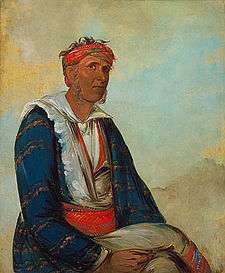John Jolly
| John Jolly | |
|---|---|
| Ahuludegi, Oolooteka | |
|
Ahuludegi, also known as John Jolly, 1834. | |
| Preceded by | Tahlonteeskee |
| Succeeded by | John Looney |
| Personal details | |
| Died |
1838 Webbers Falls, Oklahoma |
| Relations | Brother, Tahlonteeskee; Sister, Jennie Due; Nephews, John Rogers, John Rogers, Jr.; Niece, Tiana Rogers, (wife of Sam Houston) |
John Jolly (Cherokee: Ahuludegi; also known as Oolooteka), was Principal Chief of the Cherokee Nation–West when the 1828 constitution was adopted. He was a friend and protector of a young Sam Houston.
Background
Jolly "was a wealthy merchant and planter. Jolly spoke no English, and dressed in buckskin with a hunting shirt, leggings and moccasins," according to the Cherokee Nation website.[1]
John Jolly was headman of Cayuga town (on Hiwassee Island in present-day Hamilton County, Tennessee), after his brother, Tahlonteeskee's, departure for 'the west' in 1809. He eventually followed his brother to the Arkansaw Territory. There, Jolly was elected Principal Chief of the Cherokee Nation—West upon the death of his brother, in 1819.
Black Coat, who served with Jolly as Second Chief, died in the spring of 1835, and was succeeded by Joseph Vann.[2]
Friendship with Houston
When the young Sam Houston came to live with the Cherokee on Hiwassee Island in 1809, Jolly adopted him and acted as his father in the Cherokee Nation. Jolly gave Houston the Cherokee name of Ka'lanu, meaning 'the Raven'. Houston later returned to his family in Maryville, Tennessee, but he lived once again with the Cherokee in the west during the late 1820s and early 1830s.
Achievements as Principal Chief
In 1828, during Jolly's term of office, the Cherokee Nation—West adopted a constitution establishing a tripartite government, much like that previously adopted by the Cherokee Nation—East (1827). Jolly established a capital city, Tahlonteeskee, named in honor of his brother. That same year, most of the western Cherokee were moved from Indian Reserve areas in the Arkansas Territory to the newly established Indian Territory (in present-day Oklahoma).
In his role as leader, Jolly frequently raised issues of security and treaty rights with both U.S. government officials in Washington D.C. and with Arkansas territorial authorities. Shortly after being named president, Jolly wrote to Arkansas governor George Izard in alarm over rumors that the governor was about to broach the subject of the sale of Cherokee lands in Arkansas. Jolly advised the governor that the Cherokee had no lands whatsoever that they wished to sell and that, furthermore, the U.S. government was in arrears in meeting its financial obligations left over from the previous treaty of 1817. For a decade, he used diplomatic means to fend off pressures from American settlers and government representatives to restrict Cherokee lands in Arkansas and eventually to force the Arkansas Cherokee to move again out of Arkansas and into Indian Territory.[3]
One writer states that much of Jolly's success as Chief "was due to the counsel and support of John Rogers", his brother-in-law and Cherokee headman.[4]
Jolly served as Principal Chief until his death in December 1838. He was succeeded by John Looney, who had been his assistant principal chief.
Legacy
Hiwassee Island, at the mouth of the Hiwassee River where it meets the Tennessee, used to be commonly known as "Jolly's Island" after the Cherokee leader. Residents in the area sometimes still call it that.
See also
Notes
- ↑ "About the Nation: John Jolly". Cherokee Nation, The Official Website of the Cherokee Nation. Retrieved 2012-11-28.
- ↑ Gaston L. Litton (September 1937). "The Principal Chiefs of the Cherokee Nation". Chronicles of Oklahoma. 15 (7). Retrieved 2012-11-28.
- ↑ "John Jolly (?–1838)". Encyclopedia of Arkansas. Retrieved 2012-11-28.
- ↑ John Bartlett Meserve. "Chief Thomas Mitchell Buffington and William Charles Rogers". Chronicles of Oklahoma. Retrieved 2012-11-28.
Sources
- McLoughlin, William G. Cherokee Renascence in the New Republic. (Princeton: Princeton University Press, 1992).
- Wilkins, Thurman. Cherokee Tragedy: The Ridge Family and the Decimation of a People. (New York: Macmillan Company, 1970).
External links
| Preceded by Tahlonteeskee |
Principal Chief of the Cherokee Nation–West 1819–1838 |
Succeeded by John Looney |
